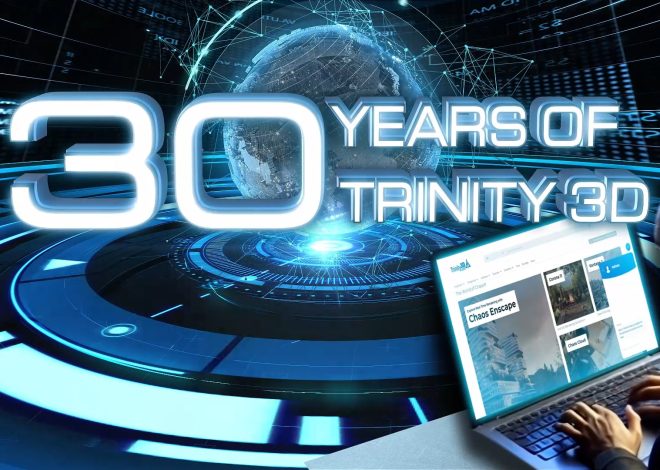
Uncrossing the Wires: Technology Discussion at UMKC
Trinity founder Jim Lammers is a graduate of UMKC’s school of engineering, and was asked to participate in a roundtable discussion of technology for UMKC’s “Perspectives” magazine for an article titled “Uncrossing the Wires” which can be viewed on the UMKC web site and is reproduced below for convenience.
The experts:
Mark O’Renick (B.B.A ’84)
Principal in marketing services agency Salva-O’Renick and business accelerator, Ingenology.
Nicole Emanuel (Arts and Sciences )
Award-winning painter and community artist, she works in public schools and has a nonprofit (InterUrban ArtHouse) that helps organize affordable space for artists.
Jim Lammers (B.S.E.E. ’87)
Founder and owner of Trinity Animation, a 3D animation and visualization studio that does work for the television series Archer.
Perspectives: How do you use technology in your career, and how important is it to you?
MARK O’RENICK (MO): In marketing business, tech has changed the way people gather information and learn about products and services. The way business is done gets easier, faster and less expensive. And there are more things we can do. 3D animation…I think is a great example of that.
NICOLE EMANUEL (NE): In the arts, connectivity is the most important part of it. I can work with people I am nowhere near and organize vast projects that involve large numbers of people. And I can invite the audience and set the whole thing up virtually. The important part is the face-to-face, and the part that’s on the ground and real. The other aspect is that I’m also a writer, and the availability of research information from my home is constantly surprising. I can do research into historical aspects that I could not have done, even if I knew what library it was in. And now I don’t have to travel.
JIM LAMMERS (JL): The whole thing we do is pretty pictures created with computers. The computers give us the efficiency to do it in a way that makes it a real good deal for our customers because we can revise it easily. Technology’s been at the core of it from the very beginning, and when the Internet started to become really common in the later ’90s, our business really took off because we were able to market worldwide.
How does the omnipresence of technology affect the three of you?
MO: There’s an interesting dichotomy that technology provides, in that it has brought us closer together, and yet in many ways we’re further apart in terms of interpersonal relationships. We’ve kind of lost the art of the long, slow dinner. We tend to communicate in 140 characters or by text. It’s not the most efficient way.
NE: To be in a room when someone is playing guitar or doing a sculpture or playing the violin and interacting with the kids, and physically experiencing that immediacy. I don’t think there’s a replacement for that visceral experience. One of the difficulties in the art world is the replacement of direct access to materials and your audience. This once-removed element when you’re working through technology and your work becomes digitized, there’s an element of sensual displacement. The senses are less directly involved.
JL: I agree. It’s important to remember the human factor. I wouldn’t say that technology within our firm and within our lifestyle has got any downside, but just like anything, every individual has to remember that they control it and not the other way around. I don’t take my cell phone into meetings, luncheons or anything. You have to make the important things come first and put the cell phone away.
MO: They’re laughing at me because I’ve got my cell phone out. I was just checking my email.
With that in mind, what piece of technology is most damaging to our attention spans? Most beneficial?
NE: Anything that breaks your ability to make eye contact. If you are looking down at a screen and not facing the person you’re with at a dinner table or in a meeting and constantly checking your boops and your beeps, there’s something lost in that. It can be anything technologically that keeps you from being in the moment.
JL: I totally agree. People need to learn that just because the phone’s ringing, it doesn’t need to be answered. Sometimes it’s smart to leave the phone in the car and come be part of the meeting or come be part of the interaction with other people. This is something that needs to be communicated more with the under-25 crowd. It’s kind of a joke. You’ll have a gathering of 20-somethings and none of them are looking at each other.
MO: Yeah, I think phones are the biggest because they’re so portable. My daughter’s 14 and we text. She won’t pick up the phone and answer, you know? It’s five texts to get done what I can get done in 30 seconds.
NE: It’s requiring us to completely rearrange our sense of discipline. What’s urgent, like this sensation in your pocket, is what’s important right there in front of you. The urgency message is something you have to have discipline to corral yourself away from.
JL: It shows a kind of disrespect in my view if you’re with someone and they would rather take a call. It’s like, “I’m here! I’m alive, across the table from you!’”
ME: Right. Weird new etiquette on these things, huh?
How does that on-demand mentality affect what you do professionally?
MO: There’s this expectation that we can track everything, and if we can track everything, we can deliver the perfect result. But humans aren’t predictable. Technology is never an end, in and of itself.
NE: I got distracted and forgot the question. Oh, shortened attention span. I’m more interested in being with people and watching them perceiving, understanding how things are made, working with materials, getting dirty, having conflicts and having them resolved.
JL: That’s an interesting point. We try to find ways to make it work for us. Businesswise, technology has taken us so much farther than we would be otherwise. The younger group will adapt and work it into their etiquette and their behavior in a way that works for them.
MO: Yeah, and I wouldn’t trade it for everything in the world. Technology has given us so much. It’s just the management of it that’s critical.
NE: Well, and never losing a sense of social responsibility that those tools give us. There will always be differences in resources, class and wealth. If we don’t use the technology to give more to people who don’t have it, I think that’s a misuse.
Are we better off now than we were 10 or 20 years ago? Are you excited for what comes next?
NE: How would you know if it’s better if you don’t know what the future is? But the promise for neuroscience and the ability to understand the use of technology to improve our physical existence is really exciting. Artistically, there are probably all kinds of things coming that we couldn’t even conceive of. Who would have known that we could have the 3D resolution that we have in animation? Animation is remarkable right now.
Does that threaten you as an artist or do you embrace not knowing what might come next?
JL: To me, it’s all wonderful and exciting. I agree that the current time is the best it’s ever been. Even in human terms for communication, the ability to reach out and connect with people who I would have otherwise lost touch with, I think the good outweighs the bad by far. It’s just a really wonderful time to live in.
MO: Right now, the kids growing up are natives. They’re going to do things with it that we couldn’t imagine because it’s just been ingrained in who they are.
NE: Our capacity to know what’s happening in every corner of the world is a little overwhelming, but at the same time you use your skillset to respond to that. Think globally, act locally. There’s nostalgia or a kickback from technology that people are getting much more interested in local food providers, artists and performers. There’s a little bit of loyalty for what’s around you. And the answer is no, not threatened. Excited, definitely. Just think about how many more people get seen or heard.
Is there a chance that the generation being brought up is better equipped to turn shortened attention spans into a positive?
NE: It’s changing our consciousness. Maybe what this is going to do is tap into ways of using our intelligence, consciousness, sentience and morality in bigger ways. It’s exploding the universe in a good way.
JL: In general, a shortened attention span is never a good thing. It’s nice that these people have really good multi-tasking abilities and they get a job where they have to answer the phone, answer emails and run around really fast and that’s a skill they’ve built. But all the good things require a good, long ability to focus on something hard and solve it. That’s usually the people who have the most important positions in our society.
As tech changes, is that going to determine who’s successful?
JL: It might be the great divide. Who can continue to have a good attention span and who is brought down by all their distractions? That’s always who wins— the person who can study, focus and become really good at something.
NE: But then that person also has to be able to communicate in the language of the population. They have to be able to translate from that long thought into pieces that the common denominator would be attracted to, like Facebook.
JL: We still have a heavy curriculum at UMKC that people have to be able to go home for four hours, turn everything off, study and get through it. I don’t think that’s going away.
MO: I think it comes back to something that was said earlier: Discipline— how we compartmentalize our time. The interesting thing about focus is that I think technology and the accessed information empowers that focus greater than it ever has. You can learn anything you want to learn. The tools are out there and you can learn it fairly quickly just by taking advantage of the tools and technology that’s available.
NE: I was thinking of the definition of time and how technology has changed the concept of time. If you know that a certain moment in the day is the best time to concentrate or is the best time to have all your interactive, distractive, interruptive time. Time is also completely accessible through computers. You can go all the way back through history and still be in a room with someone. Do you understand what I’m saying? It’s like time has suddenly blown out into this multi-level animal. Technology lets us dip in.
MO: Distractions have always been there. There was the water cooler, right?
NE: But time was more linear. Now it has many more dimensions. Because within one hour, what you can achieve by going into the past, crossing a geographic border, planning something ahead, putting that down, doing something you started earlier…your ability to go completely in and out of different timeframes is new.
MO: It’s evolving. Everything is evolutionary.
NE: Yes, and becoming more complex.
If I asked each of you to look forward, what does the future in your fields look like? Do they exist and in what form?
JL: If the type of animation we do right now becomes so straightforward that people aren’t willing to pay for it anymore, we would have to move on to something that’s hard enough that people need help doing it. We’re always watching that and moving onto the harder things and moving on from the things that have become too simple.
MO: We’re similar from a marketing perspective. What doesn’t change is storytelling from a marketing perspective, helping people understand their company, their product, their services and the connection of that to their customers. Customers are going to tell you more about that too with social media. The value for us will be helping people tell stories and how that gets delivered will continue to change and morph.
NE: I think that’s primal. Storytelling is innate to human beings. I don’t think we’re ever going to replace love and affection. I’m not going to stop cuddling my kids because the computer is more interesting. And I probably won’t stop painting, because I like the smell and the noise. I think advances in all the art forms are remarkable and wonderful, but I don’t think we’ll ever move away from our need to tell stories and connect and feel.
JL: I agree that there are certain human universals that will continue. As Nicole said, storytelling and visual design and the visceral act of painting and drawing and that sort of thing flows through all of us. But I think in terms of business and making a living, we only get paid to do things that are hard for other people to do.
Any final words?
NE: I don’t ever want to feel as though we abdicate our sense of responsibility, in particular our ability to sustain the planet. If we don’t use our technology to deal with our responsibility to other people and the environment, none of the access, the money or the resources mean anything.
MO: Beyond the technology, the two primordial fears that drive us all is the fear of not having enough and not being enough. If we don’t have the latest iPhone or whatever, it affects us. In order to get those things, you have to race to get more money. We are not rats, and life is not a race.
JL: I agree with the sentiment that you can’t allow technology to control you. You have to employ it where it helps you and push it out of your life where it doesn’t help you. For me, it’s been almost universally good in terms of connecting with more people in a more meaningful way. I like that human element and I think you have to bring that into it. We get to know more people in a human way, even though sometimes they’re very far from us. It’s nice to connect with people, whether they’re in Iran, Korea or Australia and discuss in very fast terms through email the things that are on their mind. You get to know people and you get to know the universal human condition in an important way, and that is that people often have the same emotions, thoughts and feelings. It’s been eye-opening for me, and I’ve enjoyed it as I’ve seen technology grow and seen interconnectedness become more intense.



